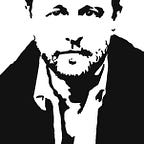LIFE’S UNSEEN AUTHOR
(ACCORDING TO SCHOPENHAUER, PLATO, HILLMAN, CAMPBELL, AND CROWLEY)
In the world of awkwardly titled essays, Schopenhauer's “On An Apparent Intention in the Fate of the Individual” may reign supreme. Its topic, however, is one that remains near and dear to my heart. In the essay, Schopenhauer suggests that viewed from a great enough distance, a person’s life seems to take on a plot — as if written by some unseen author. As if the seemingly random events that make up a life aren’t random at all, but are choreographed to push the life’s owner in a predetermined direction until the life in question takes on the qualities of a fictional story.
Schopenhauer wasn’t the only person to notice this seeming intention. The famous Greek philosopher, Plato, noticed it as well — but rather than implying the pen of some disembodied writer was at work, Plato, in the Myth of Er, suggests the existence of the Daimon — an unseen spirit assigned to each of us before birth. This spirit’s task is to direct our life in a direction chosen by our disincarnate spirit through subtle influence and directed happenstance.
Jungian analyst, James Hillman, also noticed this phenomenon. He wrote about it in his book The Soul’s Code — in which he dubbed it the “Acorn Theory” Hillman suggested that inside each of us is a pattern for a larger preordained life, waiting to be lived — the same way the blueprint for a majestic oak tree lives, as yet unrealized inside every acorn.
What then are we to take from these men and their insights? Are we doomed to a life of predestination? Has our path already been decided for us and all that’s left for us to do is blithely bounce from cause and effect until we reach the conclusion our our “story?” I suppose that’s one way to imagine our fate — nihilistically.
I prefer to see us still maintaining some degree of agency in our lives despite these theories. I tend to see the whole thing as an adapted variation of Albert North Whitehead’s Process Thought — It’s not that cosmic forces are directing our every step but rather these forces know the optimal direction our lives could take — they see our potential from a removed, higher perspective and then present us, throughout our existence, with opportunities and decisions whether or not to take that path.
In his 1988 PBS interview with mythologist, Joseph Campbell, host, Bill Moyers asked, “Do you ever have the sense of being helped by unseen hands?” Campbell answered that he believed that if you follow your bliss — meaning if you make an effort to follow your passions and do the things in life that bring you greater fulfillment and joy, you will put yourself on “a kind of track that has been there all the while, waiting for you,” Sounds a lot like the plot described by Schopenhauer or the influence of Plato’s Daimon or Hillman’s acorn blueprint.
Occultist, Aleister Crowley said, “A Man who is doing his True Will has the inertia of the Universe to assist him.” Crowley’s concept of the True Will was what we’ve been discussing — a person’s preordained life path. Crowley suggested that if we hew to this path, we are helped by the universe.
Though said in different words, Campbell and Crowley’s sentiments are nearly identical and represent, for me, why I don’t take Schopenhauer, Plato, or Hillman to describe predestination or an absence of a free will.
We are free to choose our path — but when we follow the path of our own interests, our passions, and our own proclivities, we awaken universal forces that seek to push us towards fidelity to our optimal being.
Unseen author or not, that’s a story worth living.
